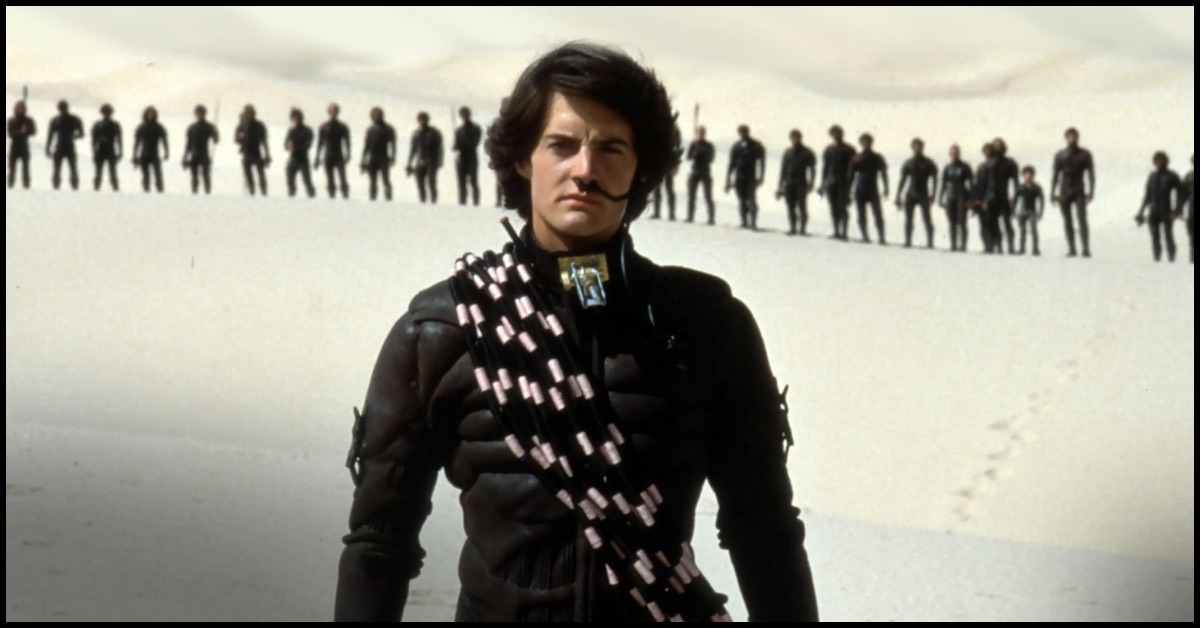As you probably know, Denis Villeneuve’s adaptation of the 1965 science-fiction novel Dune is not the first attempt to bring author Frank Herbert’s sprawling saga to the big screen. David Lynch did it first, in 1984… and it was not a success, either critically or at the box office. But it’s fascinating to revisit Lynch’s Dune after Villeneuve’s films, for the strikingly different choices the filmmakers, both of whom also wrote their own scripts, made in telling the same tale.
Villeneuve takes nearly six hours across two films — Dune is now streaming, and Dune: Part Two is currently in cinemas globally — and still leaves out a massive thread of the story: the political and economic position of the Spacing Guild, the interstellar spice navigators who hold a monopoly on space travel. Lynch crams them in — his navigators are horrifically mutated posthumans — and, like every other aspect of the tale, they are tantalizing but underdeveloped. With a runtime of 136 minutes, characters are only briefly sketched and infodumps dominate the dialogue. Lynch’s Dune is rushed and disjointed… and yet Villeneuve’s movies, if you’ve seen them, help fill in some of the blanks.
Its many flaws aside, this is an ambitious film, and there’s a surrealistic, impressionistic beauty to Lynch’s vision. The FX are horribly dated, but the vibe of elegant, baroque steampunk remains a treat. And the cast is top-notch: Kyle MacLachlan is Paul Atreides, and the cast also features Patrick Stewart, Sean Young, Francesca Annis, Dean Stockwell, Virginia Madsen, Brad Dourif, Sting, and others.
US: stream on Max (via Prime); rent/buy on Prime and Apple TV
UK: stream on Mubi (via Prime) through March 24th; rent on BFI Player and Curzon Home Cinema; rent/buy on Prime and Apple TV
See Dune (1984) at Letterboxd for more viewing options.





















The SyFy channel (when it was still the SciFi channel) also made two mini series for Dune. The first one based on the first book and the second one taking Dune Messiah and Children of Dune (The second and third novels) for its story line. Despite their limited budgets they do a good job of being the better than David Lynch Dune translation from book to screen. Of course, being mini-series they did get more time to tell the story than Lynch did.
This doesn’t mean that the mini-series doesn’t make its own changes to the book’s story line. Certain characters get more to do (like princess Irulan).
Though there seem to be at least four versions of the Dune mini-series (with running times of 265 minutes (US broadcast), 280 (international/UK versions) and 286 minutes (Director’s cut), the one to avoid is the US broadcast version as that removes some pivotal scenes due to the presence of nudity, changing some plotlines because characters actions are removed (one example given is that Princess Irulan tries to pump Feyd-Rautha for information while apparently seducing him. The US version fades out, implying that Irulan slept with him. But in the international version Irulan presents Feyd with a topless seductress/spy called Farrah as a gift and leaves.Irulan, being the heir to the Emperor is way too careful to sleep with any vassal of her Father’s in order to not take herself out of the running for a marriage of convenience, as Royalty has done since ages gone by.
The thing to keep in mind is that the first novel (which I bought this weekend, just to reread it again for the sixth time) is more than 600 pages in hardcover form, so making it into something that is only about five hours means that you will have to cut some things.
Frank Herbert wasn’t happy with the movie when it was released. His major complaint was that he’d “spent 600 pages explaining that it couldn’t rain on Arrakis, only for the movie to give Paul the magic power to make it rain at the end!”.
This not only goes against Frank’s intention of “messiahs should come with warning labels” for the story, it also gives Paul god-like powers, whereas in the books he’s just able to see potential futures and see into the racial memory of his ancestors.
Yes, I know: https://www.flickfilosopher.com/2003/06/frank-herberts-children-of-dune-review.html
True. Or maybe some novels aren’t suited for short-form adaptation.